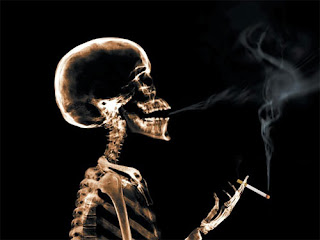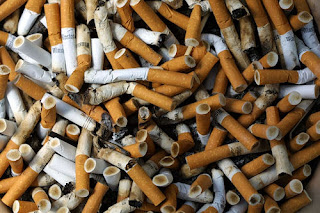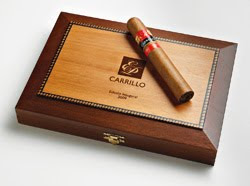
It has been a half century since a cigarette found its way between my lips.
Quitting my addiction to cigarettes was a spur of the moment decision and a dozen or more people around me at the time were doubting Thomases because they knew how dependent I was on cigarettes. Even I had some doubts - but I was determined.
It didn't take an Einstein-type decision on my part since I knew my daily habit of smoking two, and sometimes even three packs a day - depending on how much partying there was after leaving work - was an invitation to a short lifetime.
It was probably the most momentous decision I ever made because at today's prices of $5 or more a pack I'd be sacrificing grocery money to calm the craving for a smoke. But at the rate I was consuming (that's a better word than smoking because I was almost eating them) cigarettes I would not be here today to tell about it.
My friends and co-workers at the time and many, many times since then have asked the obvious question: "How'd you do it?" My stock answer was always "cold turkey." That made it sound like it was easy to do, but believe me it was not. It was agonizing for quite a while.
While pounding out a story on the old Underwood typewriter in the News-Register office, it was not uncommon to have two or three lighted cigarettes lined up on the edge of my desk. Fortunately the desks way back then had been in use for years and were scarred from cigarette burns. That doesn't happen anymore because all the desks are sparkling new and it is a smoke-free workplace.
My decision to quit came like a lightning bolt early one morning. Being deep in thought about what awaited me at the office, I did not realize until I sat down to type a story that my shirt pocket was not filled with the usual pack of butts.
Back then there was a handy cigarette machine in the office but when I searched my pockets, no change was found for the machine. Cost of cigarettes in a store ranged between 22 to 25 cents a pack. The machine required 30 cents but the buyer received two pennies change in each pack.
So I went searching for change for $1. After about a half dozen tries I finally succeeded and made a mad dash to the cigarette machine. Horrors! It was empty. I never did find out whether the mechanical monster was damaged when I kicked it.
So then I made like a beggar. First I asked Al Wyman, who was seated across from me in the newsroom. He dealt me another setback. "This is my last one," he said holding a lighted cigarette between his fingers. "I have to go out and buy some," was his reply. More contacts likewise failed. Finally I invaded Editor Harry Hamm's office. He smoked Raleigh cigarettes and I was so desperate I'd settle for one of them. I smoked Pall Mall.
That didn't work either. He, too, was smoking his last cigarette and showed me the empty pack. Even though I was having a nicotine fit with one setback after another in my efforts to satisfy my habit, it seemed I was getting a message from a greater power. When I stepped out of Hamm's office, I shouted loud enough for all to hear: "That 's it! I quit!!"
There was quick response. As I sat down to continue writing my story, Wyman took a last drag on his cigarette and said, "Al, if you quit, so will I." I considered that encouraging.
There were no patches, pills or any of the many quit smoking programs back then as there are today. If there were, they weren't as well publicized as they are today. It was a case of sheer will power and determination to quit the habit.
There were some big obstacles to overcome. At the end of every work day, it was beer time for me and a few others on the staff. But that day the beer was shoved aside. I couldn't drink a beer without craving a cigarette. So I made another big decision - I quit drinking beer.
My usual routine the next day likewise was abruptly altered starting first thing in the morning. On getting out of bed, I usually lit up a cigarette even before my feet touched the floor. Not that day or ever after.
On arriving early at the office, my day always started with a cup of coffee and a cigarette. That didn't work either. I could not drink the coffee without craving a cigarette. So there was only one thing to do: I quit drinking coffee.
So in the span of less than 24 hours I quit smoking, quit drinking beer and quit drinking coffee. Some friends felt I was headed for the looney bin.
The automatic reflex of the right hand reaching up into the pocket on the left side of my shirt was difficult to stop. So I put a pack or two of lifesavers there. I consumed them faster than I had inhaled cigarettes. For the first few weeks I consumed as many as four or five packs of lifesavers a day. For me they were no longer candy. They were - lifesavers.
While I was nervous and shaky during those early days and also suffering from stomach aches which I assumed were withdrawal pains, I fought the craving. Al Wyman's effort lasted one day. On the second day he came to work with cigarette in hand. "I can't do it," he uttered apologetically. But he, Duke Horstemeyer and others continued a daily dose of words of encouragement for me.
In the days afterwards my nervousness and shakiness calmed some but reaching for the lifesavers continued. After about a month of no cigarettes, no beer and no coffee, I felt a bit under the weather one day and decided to visit my family physician and friend, the late Dr. Charles V. Lee
After examining me, we chatted. He asked me if something usual had happened at home. My reply was no. Then he modified it a bit and asked if something different had occurred in my life. I told him nothing, except that I quit smoking, and quit drinking coffee and beer.
He couldn't hide his shock. He quickly suggested that for my continued good health and sanity it would be wise if I resumed one of the three. He said quitting all three at once was too much of a shock to my system. He made no recommendation.






